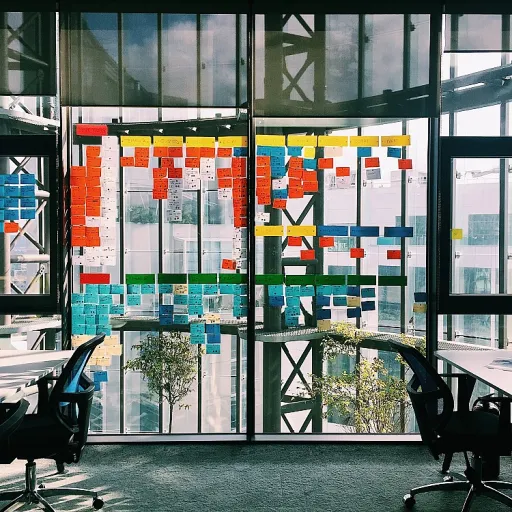-large-teaser.webp)
Understanding the Basics of PMP Process Mapping
Grasping the Essential Aspects of PMP Process Mapping
Understanding the core components of PMP process mapping is crucial for those involved in project management. This technique revolves around the systematic approach of plotting out processes to facilitate efficient project completion. By dissecting intricate processes into understandable and manageable steps, project managers can anticipate issues, streamline operations, and ensure that each phase aligns with the overall management plan.
At its core, process mapping delineates the steps involved in a project, revealing how different process groups interact within various knowledge areas. This provides a clear visual representation, which is invaluable for pinpointing potential bottlenecks or areas necessitating extra attention. For those pursuing PMP certification, mastering these mappings is essential as it forms the foundation of understanding complex project dynamics.
An integral part of process mapping is recognizing how these steps fit into the broader spectrum of management processes. Each knowledge area, from risk management to stakeholder engagement, can be visualized through these maps, transforming abstract concepts into tangible action items. Additionally, process maps are instrumental tools for fostering teamwork, as they offer a common language and focal point for discussions, supporting collaborative learning and decision-making.
Furthermore, project management professionals often leverage tools and techniques such as affinity diagrams in conjunction with process mapping. These enable deeper insights into relationships and dependencies between different facets of a project. For more on how affinity diagrams play a role in this context, this resource provides an insightful exploration.
As methodologies evolve, the integration of interactive elements, such as the process mapping game, has become popular. By incorporating a gaming element, individuals and groups can engage in a more dynamic mode of learning—this fresh approach to traditional training techniques facilitates better knowledge retention and engagement. Playing these games allows project managers to crystallize their understanding of intricate mappings, contributing to more resilient and adaptable project management strategies.
The Role of Process Mapping in Change Management
The Integral Connection between Process Mapping and Change Management
Process mapping plays an indispensable role in the change management landscape. This tool is not just a diagramming technique; it serves as a crucial bridge between the theoretical knowledge and practical execution of change initiatives in any organization.- Comprehensive Understanding of Processes: By mapping out the processes, project managers and their teams can gain a clearer understanding of how various process groups and knowledge areas interact. This comprehension is vital when implementing a change management plan, ensuring that all aspects of the project, from risk management to resource allocation, are accounted for.
- Visual Aid for Better Communication: By providing a detailed visualization, process mapping enhances communication within the project team and across departments. It allows groups involved in change management to see the current state of processes, facilitating discussions on what adjustments are necessary and how they will impact the overall project management.
- Facilitating Change through Tools and Techniques: Process mapping acts as a strategic tool by utilizing various management process techniques, such as playing games or simulation training, to foster engagement and learning. In this context, interactive games especially stand out, offering a mode of learning that is not only engaging but also reinforces key concepts crucial for the successful management of change. When you focus on this method, you effectively blend traditional knowledge with modern, interactive techniques, making the learning process both engaging and effective.
Interactive Learning: The PMP Process Mapping Game
Interactive Engagement Through Gaming
Engaging groups of learners using the interactive pmp process mapping game is swiftly becoming a popular mode of learning in the field of project management. This game allows participants to immerse themselves in the complexities of the various process groups and knowledge areas found within pmp certification studies. It’s more than just play — it's a tool for developing a deeper understanding of management processes, essentially making learning both dynamic and effective.
During these sessions, players take on the role of a project manager, tasked with mapping out processes that align with a comprehensive project management plan. Through this play game approach, players will engage in real-time decision making, simulating the challenges faced in actual project scenarios. The process game will also introduce they to different tools and techniques associated with each process group, fostering a practical understanding that can support them during the pmp exam.
By integrating elements such as risk management and other management processes into the game, participants are not only learning about individual knowledge areas but also how they interconnect within a project’s lifecycle. The playing game experience ultimately leads to a more meaningful understanding, preparing individuals to effectively contribute within various area project contexts.
Benefits of Using Games in Process Mapping
Harnessing the Power of Games in Process Mapping
Employing games in process mapping not only energizes the learning environment, but also fosters an interactive approach to understanding the complexities of project management. In the realm of PMP, process mapping games act as a powerful tool and technique that integrates play with the detailed analysis of management processes. These games are crafted to provide project managers and teams a hands-on experience in dissecting the elements of PMP process mapping, enhancing their grasp on both knowledge areas and process groups. Games move beyond theoretical knowledge, immersing players in scenarios that require them to apply real-world skills. This active participation ensures deeper retention of project management concepts and provides a practical understanding of each knowledge area. Process mapping games offer a different mode of learning, especially beneficial for those preparing for the PMP exam. Moreover, these games serve an essential function in reinforcing the major process groups and the specific roles they play within a project. While traditional training techniques focus on rote learning, process mapping games facilitate an engaging method to explore and learn about decision-making, resource allocation, and risk management within a project management plan. Additionally, playing a mapping game aids in testing and improving the practical application skills of project managers. Through repeated play, participants are able to fine-tune their strategic planning and execution abilities across various areas of a project, leading to more informed decision-making and effective management skills in actual projects. In essence, games serve as an innovative training tool that brings an element of fun to the critical task of mastering PMP process mapping. They help bridge the gap between theoretical knowledge and practical application, equipping individuals with the necessary skills to navigate the multifaceted world of project management successfully.Challenges in Implementing Process Mapping Games
Overcoming Obstacles in Process Mapping Games
Implementing process mapping games within project management can enhance project execution by improving learning and engagement. However, challenges in execution are inevitable and need addressing to ensure that these game-based approaches fulfill their potential as sustainable training tools.- Adapting Games to Different Processes: Each project management process, or knowledge area project, requires nuanced understanding. Aligning game content and structure with specific processes can be challenging. Tailoring games to specific process groups or areas often demands considerable customization to reflect the diverse settings and objectives in project management.
- Engagement Levels: The process game mode ideally energizes and motivates groups. Nonetheless, some management project teams may struggle with engaging fully. Encouraging active participation by creating a sense of playfulness can offset disengagement, yet overcoming hesitations around non-traditional training methods can be difficult.
- Resource Allocation: Developing and deploying a comprehensive mapping game with effective tools techniques can be resource-intensive. Organizations must plan meticulously, ensuring the required resources—both time and budget—align with project objectives for successful implementation.
- Technology and Infrastructure Demands: Not every organization possesses the digital capabilities to support a fully interactive game mode. Companies must assess their existing infrastructure and willingness to invest in technology to ensure seamless implementation and use of these management tools.
- Resistance to Change: Integrating new methods like a process game into entrenched training regimes can meet resistance from staff accustomed to traditional learning modes. Overcoming this requires change management strategies to counteract resistance and emphasize the benefits of interactive learning in enhancing process knowledge.
- Assessment and Feedback Mechanisms: Ensuring effective feedback channels and assessment criteria may pose challenges. Despite game-based learning’s ability to simulate real-world scenarios, it is crucial to establish reliable assessment points and mechanisms to capture learning outcomes and areas needing improvement.













